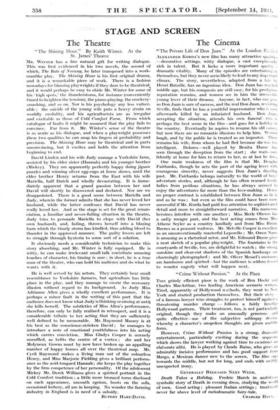STAGE AND SCREEN The Theatre
"The Shining Hour." By Keith Wintei. At the St. James' Theatre MR. WINTER has a fine natural gift for writing dialogue. This was first evidenced in his two novels, the second of which, The Rats of Norway, he later transposed into a work- manlike play. The Shining Hour is his first original drama, and it is a remarkable piece of work. There is a fashion nowadays for blaming playwrights if they dare to be theatrical and it would perhaps be easy to chide Mr. Winter for some of his high spots,' the thunderstorm, for instance (conveniently timed to heighten the tension), the piano-playing, the crockery- smashing, and so on. Nor is his psychology any less vulner- able ; the suicide of the young wife puts a heavy strain on worldly credulity, and his agriculturists are as irregular and excitable as those of Cold Comfort Farm. From which catalogue of faults it might be assumed that the play fails to convince. Far from it. Mr. Winter's sense of the theatre is as acute as his dialogue, and when a playwright possesses these two qualities he can snap his fingers at probability and precision. The Shining Hour may be theatrical and in parts unconvincing, but it excites and holds the attention from beginning to end.
David Linden and his wife Judy manage a Yorkshire farm, assisted by his elder sister (Hannah) and his younger brother (Mickey). They are apparently perfectly happy doing jigsaw puzzles and winning silver egg-cups at horse shows, until the elder brother Henry returns from the East with his wife Mariella, half Dutch and wholly devastating. It is imme- diately apparent that a grand passion between her and David will shortly be discovered and declared. Nor are we disappointed. There is a good scene between Mariella and Judy, wherein the former admits that she has never loved her husband, while the latter confesses that David has never really loved her. And so the stage is set for the great renun- ciation, a familiar and never-failing situation in the theatre. Judy tries to persuade Mariella to elope with David (her own husband), and, failing, throws herself into a blazing barn which the timely storm has kindled, thus adding blood to thunder in the approved manner. The guilty lovers are left to struggle through hysteria to some sort of a solution.
It obviously needs a considerable technician to make this story absorbing, and Mr. Winter is fully equipped. He is witty, he can make irrelevant small talk contribute amusing touches of character, his timing is sure ; in short, he is a true man of the theatre, who can hold his audience- and do what he wants with it.
He is well served by his actors. They certainly bear small resemblance to Yorkshire farmers, but agriculture has little place in the play, and they manage to create the necessary illusion without regard to its background. As Judy Miss Adrianne Allen gives a wholly excellent performance. It is perhaps a minor fault in the writing of this part that the audience does not know what Judy is thinking or aiming at until she kills herself. The subtleties of Miss Allen's performance, therefore, can only be fully realized in retrospect, and it is a considerable tribute to her acting that they are sufficiently well defined to be memorable. Mr. Raymond Massey is at his best as the conscience-stricken David ; he manages to introduce a note of emotional youthfulness into his acting which carries conviction.. Miss Gladys Cooper is serenely unruffled, as befits the centre of a vortex ; she and her Molyneux- Gowns must by now have broken up an appalling number of happy homes all over the theatrical map. Mr. Cyril Raymond makes a living man out of the colourless Henry, and Miss Marjorie Fielding gives a brilliant perform- ance as the acid-tongued Hannah; she keeps the play together by the firm competence of her personality. Of the adolescent Mickey Mr. Derek Williams gives a spirited portrait in the Cold Comfort tradition ; a little more bronzed torso disclosed on each appearance, uncouth egoism, boots on the sofa, occasional lechery, all are in keeping. 'No wonder the fanning industry in England is in heed of a subsidy.
RUPERT HART-DAVIS.










































 Previous page
Previous page